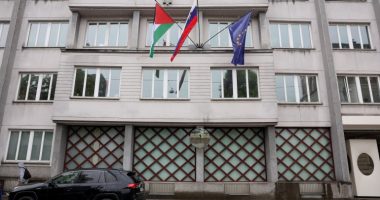The shadow foreign minister, Simon Birmingham, has suggested the Morrison government’s megaphone diplomacy with China was counterproductive and a future Coalition government would approach the relationship differently.
In an interview for Guardian Australia’s Australian Politics podcast, Birmingham conceded that blasting China in public had had negative consequences.
He said a better approach in future would be to ensure China was not blindsided by public criticisms and that, when such criticisms were warranted, they were delivered alongside international partners.
“Can you look back on any one incident or otherwise and consider lessons to be learned? Yes,” Birmingham said of the Morrison government’s handling of the China relationship.
“What is the approach that I would bring if I were to be foreign minister in a future Coalition government? Well, it is one of making sure that there are no surprises, that if there are to be comments made and issues raised, we would do our best to ensure they were raised directly with Chinese authorities as well as then being being dealt with in public, where appropriate, in international fora with other international partners.”
Asked if he was referring to the controversial call by then foreign minister Marise Payne – backed later by Morrison – for an international inquiry into the origins of the Covid-19 virus, Birmingham declined to nominate any one incident. That public demand enraged China and has been criticised frequently by Chinese officials since.
“[I’m] not singling any one thing out because in some of these cases, I’m not aware of all of the discussions that were had,” Birmingham said. “I think that call made sense and ultimately, the World Health Organisation did pursue inquiries. And it was right of us to expect that, that would occur.”
The shadow foreign minister said China was “deploying a very different tactic right around the world at the time, the so-called wolf-warrior diplomacy” and that its approach had changed.
But there were “always lessons to learn out of incidents and periods in history”.
“The approach that I would want to bring is certainly one of being as firm and clear in our principles as possible,” he said. “But also seeking to ensure the lines of communication were open and there were no surprises. We should be predictable as well as transparent.”
Birmingham’s comments follow this week’s four-day visit to Australia by Chinese Premier Li Qiang, the first such high-level visit by a Chinese leader in seven years, as both governments seek to reset a relationship that spent years in the deep freeze.
He welcomed what he described as “a positive visit”, highlighting the agreement to establish a “back channel” for urgent military contact. The arrangement is designed to prevent any escalation should there be repeats of recent altercations involving Chinese and Australian military ships and aircraft.
“We shouldn’t see that as a solution, but rather as just a help,” Birmingham said. “… The real solution would be for China to cease engaging in military conduct in the region in ways that [are] dangerous, and that creates the risk of escalation.”
Birmingham said it was good that almost all of the tariff barriers against Australian goods that China imposed as punishment – “economic coercion” – for Australia’s outspoken criticisms had been removed. But he suggested China did not deserve congratulations.
“We should expect those tariffs and expect those trade barriers to be removed, welcome the fact that they are, but there’s nothing really to be grateful for,” he said. “There is simply a case of China being expected to live up to their word, that they gave to us.”
He criticised what he said was Prime Minister Anthony Albanese’s slow and muted response to Chinese embassy officials standing over Australian journalist – and former political prisoner in China – Cheng Lei during an event at Parliament House.
“I think we have to be in an environment where we speak plainly and openly in public and in private, not in hostile ways but in appropriately forthright and direct ways,” Birmingham said.
“And, if there is to be a particular criticism of the way the prime minister has conducted himself, it feels like he has excessively held back his remarks in a public lens, when there has been space for him to make comments that could have been calmly made, sensibly made, but should have been made… He appeared to wish it all away rather than being willing to state clearly what Australia’s principle and position should be.”
At a solo news conference after the state lunch in Li’s honour – which had followed the event at which the standover incident occurred – Albanese told journalists he was unaware of what had happened. He subsequently said he protested later, direct to the premier, about the officials’ actions and has rejected suggestions he did not adequately condemn the behaviour.
Birmingham told Guardian Australia he doubted the explanation for Albanese’s initial public hesitancy and suggested in that case, staff should have been reprimanded.
“If he was telling the truth that he wasn’t aware, then they certainly would need to have been repercussions in his office because it seems so implausible that he could not have been aware.”
Read More: World News | Entertainment News | Celeb News
Guardian
